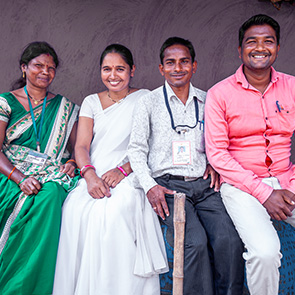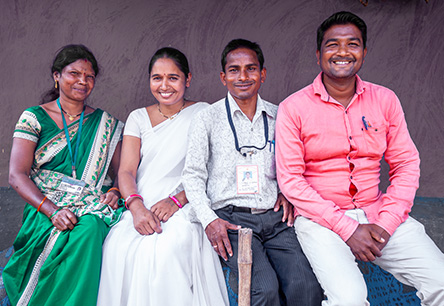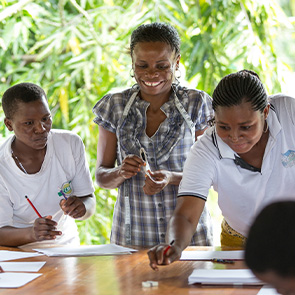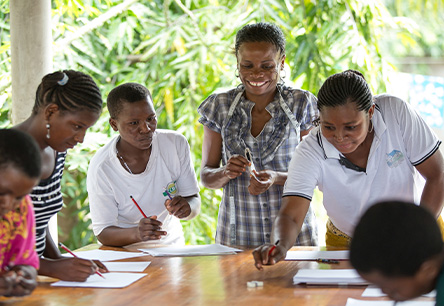Antimicrobial resistance (AMR) is already a crisis, made even more concerning by the COVID-19 pandemic. As microorganisms develop resistance to medicines that millions of people have relied upon for years, common diseases are becoming difficult or impossible to cure and the spread of infections harder to control.
As the largest, most diversified healthcare products company, with a purpose to profoundly change the trajectory of health for humanity, we care deeply about reversing the development of AMR. Rising AMR has been ranked among the most significant health threats facing the world by the WHO and, left uncontrolled, could turn routine infections and surgical procedures into life-or-death situations.
To help counter the AMR threat, Johnson & Johnson has committed to investing in and advancing critical science, as well as providing access to antibiotics and safeguarding their long-term effectiveness, to meet public health needs. As part of these efforts, Janssen is leading the pursuit for novel vaccines and therapeutics to tackle a range of drug-resistant infections, including DR-TB and E. coli. Specifically, our decades of investment in helping end TB is a critical contributor to our efforts to outpace AMR.
WHO has declared that AMR is one of the top 10 global public health threats facing humanity.45 Annually, 1.2 million deaths are attributable to AMR, and 4.9 million deaths are associated with AMR.46
Johnson & Johnson is also a founding member of the AMR Action Fund and the AMR Industry Alliance, which are focused on creating the sustainable ecosystem of investment and innovation to tackle the AMR threat. In 2022, the AMR Action Fund made its first investments in two companies, Adaptive Phage Therapeutics and Venatorx Pharmaceuticals, promising to deliver innovations that can change the treatment landscape for drug-resistant infections and advance the AMR Action Fund’s goal of bringing two to four new antibiotics to market within a decade. Our $100 million commitment to the Fund is helping advance toward this goal.
Advancing our ExPEC vaccine
ExPEC is one of the leading pathogens in the AMR crisis. Last year, we initiated our Phase 3 E.mbrace study to evaluate the efficacy, safety and immunogenicity of a single injection of our investigational vaccine to prevent Invasive ExPEC Disease (IED), such as sepsis, caused by the nine most prevalent serotypes of ExPEC, in adults aged 60 years and older. It is a multicenter event-driven vaccine efficacy study featuring a group-sequential design and includes over 18,500 adults aged 60 years and older with one or more additional risk factors for invasive disease.
Anil Koul, Ph.D.
Vice President, Discovery and Partnerships, Global Public Health R&D, Janssen R&D
Dedicating resources to AMR science
In 2022, we expanded our J&J Centers for Global Health Discovery (J&J Centers) with the launch of the Johnson & Johnson Satellite Center for Global Health Discovery at the Holistic Drug Discovery and Development (H3D) Centre at the University of Cape Town in South Africa. This Satellite Center is working to drive new solutions to address the present and rising threat of AMR with a specific focus on multidrug-resistant Gram-negative bacteria (MDR-GNB). Teams from Janssen and H3D will leverage their combined global, institutional and regional strengths to bolster the early stage science, innovation and talent development needed to tackle AMR. Research at the new Satellite Center will build on Johnson & Johnson’s decades of work accelerating innovation—from the lab-to-last-mile of healthcare—to outpace the threat of AMR.
Johnson & Johnson is one of the top three companies leading the way in addressing the complex health challenge of AMR, as assessed by the independent Access to Medicine Foundation in its third AMR Benchmark published in 2021.
Kelly Chibale, Ph.D.
Founder and Director of H3D
Sharing data to accelerate AMR research
In 2022, we were pleased to commit to participating in a groundbreaking data-sharing initiative to increase understanding of AMR, launched by nonprofit Vivli. The AMR Register makes it possible for biopharmaceutical companies to share susceptibility data on infection-causing pathogens for the first time ever in one online platform, marking a critical step in combating the growing global health threat of AMR. With the active participation from leading pharmaceutical and biotech enterprises, including Johnson & Johnson, researchers will be able to use the AMR Register to translate masses of AMR surveillance data into meaningful action that saves lives and preserves antibiotics for future generations.
45WHO, “Antimicrobial resistance,” https://www.who.int/news-room/fact-sheets/detail/antimicrobial-resistance, accessed February 2023.
46IHME, “The Lancet: An estimated 1.2 million people died in 2019 from antibiotic-resistant bacterial infections, more deaths than HIV/AIDS or malaria,” https://www.healthdata.org/news-release/lancet-estimated-12-million-people-died-2019-antibiotic-resistant-bacterial-infections, accessed February 2023.








